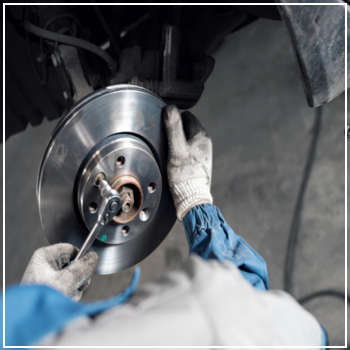 Your car’s braking system is one of the most important parts for your safety on the road. While you may not think about it every day, regular maintenance and attention to warning signs can prevent costly repairs and keep you safe. Don’t wait until something goes wrong—stay proactive with your brake care.
Your car’s braking system is one of the most important parts for your safety on the road. While you may not think about it every day, regular maintenance and attention to warning signs can prevent costly repairs and keep you safe. Don’t wait until something goes wrong—stay proactive with your brake care.
How Do Vehicle Brakes Work?
Brakes are essential for stopping your vehicle safely. They work by using a combination of components such as brake pads, rotors, and calipers. When you press the brake pedal, hydraulic pressure forces the caliper to clamp down on the rotor, creating friction that slows your car down. This system relies on the brake fluid to function properly, so any leaks or issues can impact performance.
Over time, the brake pads wear down due to constant friction. If they become too thin, they can no longer provide effective stopping power. In some cases, this leads to metal-on-metal contact between the caliper and rotor, which can damage both parts and lead to more expensive repairs.
Squeaking, Grinding or Rubbing
If you hear unusual noises when braking, it could be a sign that your brake pads are worn out. Squeaking is often an early warning, while grinding or rubbing sounds usually mean the pads have completely worn down. At this point, the metal parts of the brake system are likely making contact, which can damage the rotors and require replacement of both the pads and rotors.
Vibrations
A vibrating steering wheel or brake pedal can be a sign of warped rotors or unevenly worn brake pads. It might also indicate an alignment issue. Either way, these symptoms shouldn’t be ignored, as they can affect your control over the vehicle and increase the risk of accidents.
Clicking Sounds
A clicking noise when braking could mean that a part of your brake system has come loose. This might be a clip or pin that holds the brake pad in place. If left unchecked, this issue can lead to more serious problems, including damaged hardware and reduced braking efficiency.
Increased Effort to Brake
If you find yourself pressing harder on the brake pedal than usual, it’s a clear sign that your brake pads are wearing out. This could also indicate a problem with your brake fluid or air in the system, which affects how quickly your brakes respond. Ignoring this symptom can lead to a loss of braking power and a dangerous driving situation.
Pulling to One Side
If your car pulls to one side when braking, it might be due to uneven brake pad wear, a faulty caliper, or contaminated brake fluid. This issue can put extra stress on your car's suspension and steering components, leading to long-term damage if not addressed promptly.
Brake Warning Light
The brake warning light on your dashboard is a clear signal that something is wrong. It could indicate low brake fluid, worn pads, or a leak in the system. Checking the thickness of your brake pads is a good first step—if they’re less than a quarter inch thick, they need to be replaced.
Burning Smell
If you smell burning rubber or something similar when braking, it’s a serious warning. This could mean that your brakes are overheating due to excessive use or a malfunction. In this case, your car is unsafe to drive, and you should stop immediately and seek professional help.
If you notice any of these signs, don’t delay. Contact DaSilva’s Auto Body for a thorough inspection and expert advice. Whether it's a simple fluid check or more extensive repairs, we're here to ensure your brakes are working properly and your driving experience remains safe. Call us today at our Naugatuck location to schedule an appointment and keep your car in top condition.
Square Wire Mesh,Square Woven Wire Mesh,Electro Galvanized Square Wire Mesh,Galvanized Square Woven Wire Mesh
HEBEI CONQUER HARDWARE WIRE MESH CO.,LTD , https://www.anjiahardware.com